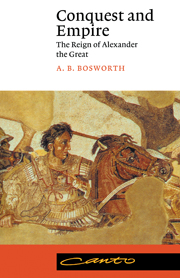D - The divinity of Alexander
Published online by Cambridge University Press: 05 August 2012
Summary
The reign of Alexander marks a watershed in the development of the ruler cult. After his death divine honours for living monarchs become almost commonplace. Before his time such phenomena are very scantily reported in the sources, and the few attested instances of divine honours for living men have been treated with scepticism by some modern scholars. There can be little doubt that Alexander changed the entire climate of thought, creating aprecedent for the worship of a sovereign as god incarnate and prefiguring the cults of the Hellenistic rulers. What is far from clear is the process of evolution in the course of the reign and the extent of Alexander's belief in his own divinity. At one level there is his deep consciousness of his heroic ancestry (as an Argead he took his lineage back to Heracles and ultimately to Dionysus), at another there is his conviction that he was in some sense the son of Zeus, the equal at least of Heracles, and finally there is the conception of himself as a god among men. These categories are fundamentally different and represent different aspects of Greek religious thought, but in Alexander's mind they must have been conflated. His acceptance of one role could lead automatically to another, and the son of Zeus might (after sufficient infusions of flattery) come to view himself as a god in his own right.
Originally there had been a clear distinction between god and man, based on the impassable gulf between mortality and immortality. The gods by definition were ageless and deathless, whereas mortals by definition were neither.
- Type
- Chapter
- Information
- Conquest and EmpireThe Reign of Alexander the Great, pp. 278 - 290Publisher: Cambridge University PressPrint publication year: 1993

